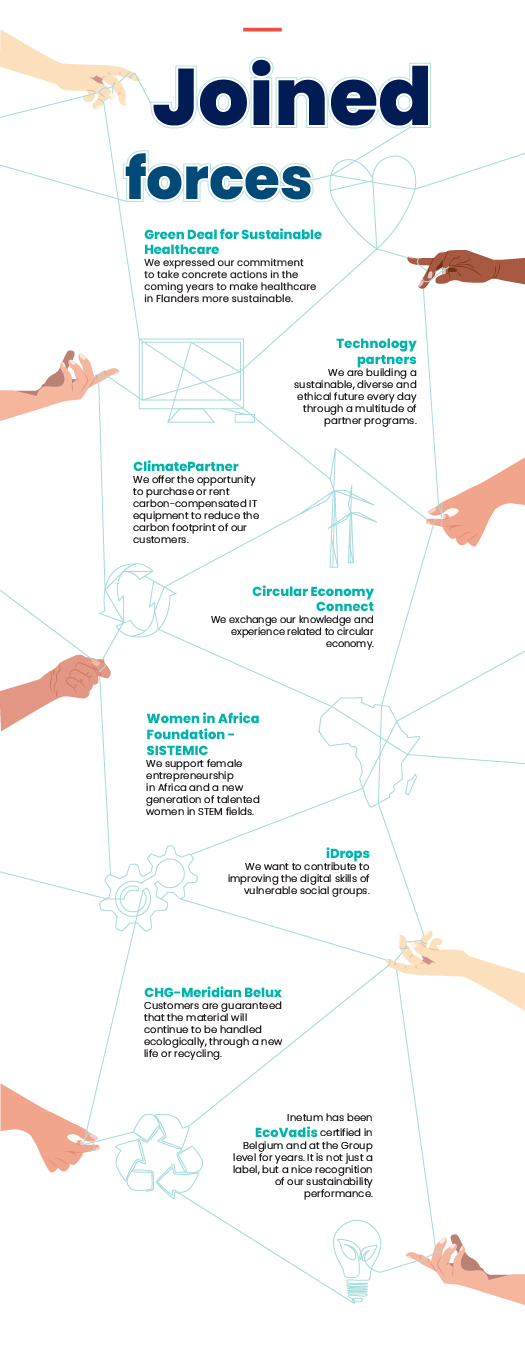Hanne, as a Business Consultant Sustainability, you help support our company’s sustainability story. How did you become interested in this?
Up to a few years ago, I didn't think much about sustainability. When I became a mother, my priorities gradually changed to reflect concern for my children's future. Initially, I thought it would be difficult to consume with humans and nature in mind without affecting our quality of life, but I soon discovered that every little step helps. It also doesn't feel like a burden at all. I get real satisfaction from it – so much so that last year I decided to bring that focus to my work as well. After all, companies play an important role in the transition to greater sustainability, and I wanted to contribute to that. Just at that moment, the vacancy for Business Consultant Sustainability was advertized. So the stars were aligned, and I couldn't pass up that opportunity.
When we talk about business and sustainability, you regularly hear voices about the apparent paradox between profit and sustainability.
In my opinion, there is no paradox between profit and sustainability, unless you have a short-term vision. A successful sustainability policy has become vital due to socioecological pressure. Sustainable action is necessary in order to continue to create value. It is therefore at the top of every company’s agenda today, including ours, and has to do with social commitment and policies regarding ethics and ecology.
Nevertheless, I believe that socially committed, ethical and ecological business should not be done from a desire to survive, but from the belief that this is the only way of working that is truly satisfying for all stakeholders and the community in general, but also for our employees, customers, suppliers and shareholders. That is why we work with this attitude, both internally and towards our customers.
How does this translate into your role as Business Consultant Sustainability?
From Business Sector Consulting, we help customers in various areas embed sustainability into their way of working.
It all starts with awareness. Sustainability is a broad and diverse topic, but for many it is still abstract and theoretical. The focus will always have to be on something else. We use our industry and sustainability expertise to make sustainability tangible, adapted to the context. In this way, we help to process and take ownership of what sustainability can mean for organizations.
The next step is to make the transition from personal understanding to sustainability on an organization's part. This is not something you implement overnight, even though the awareness may be in place. Cultural change requires a mind shift, one that we are happy to support.
This goes hand-in-hand with setting up an approach in which all stakeholders are involved; drawing up or optimizing business processes on the strategic, tactical and operational levels. A concrete example is the double materiality analysis, which provides direction, but also prepares for coming regulations such as the European Corporate Sustainability Reporting Directive. Another example is the mapping of current, usually linear, processes, and working from a continuous improvement methodology towards optimized circular models.
As an IT company, do you also link IT's impact to the sustainability story?
Indeed, the issue of sustainability is so complex and extensive that it requires a systemic approach to make progress. A constant here is the importance of technological applications to support a sustainable mindset. From that point of view, I actively form the link with the rest of our organization.
We want to bring customers into a positive digital flow, which is why we are constantly looking for digital strategies that meet our customers’ business challenges sustainably. For example, extending the life of equipment, developing inclusive, accessible and sustainable services (Useful, Usable and Used), proper GDPR policies where we collect only useful and necessary data for service delivery, and making the impact of IT products visible, and so on. An important topic is analyzing how we can identify, capture, process and share sustainability data through technology applications so that organizations can incorporate it into their sustainability story.
In summary, this means that we try to reduce the negative impact of IT on our society as much as possible, while using the positive impact as a lever for a sustainable future.
Do you have a last word for anyone with questions about sustainability?
To inspire and be inspired are important keywords for me. Every small individual action has value, but I strongly believe that together we can really turn things around. You can therefore find me if you want to knock ideas around on the role sustainability can play within your organization.
Building sustainability isn’t something you do alone. That's why our company crosses its own borders every day and seeks the magic of joined forces. In this infographic, we would like to give you a non-exhaustive list of great collaborations!






